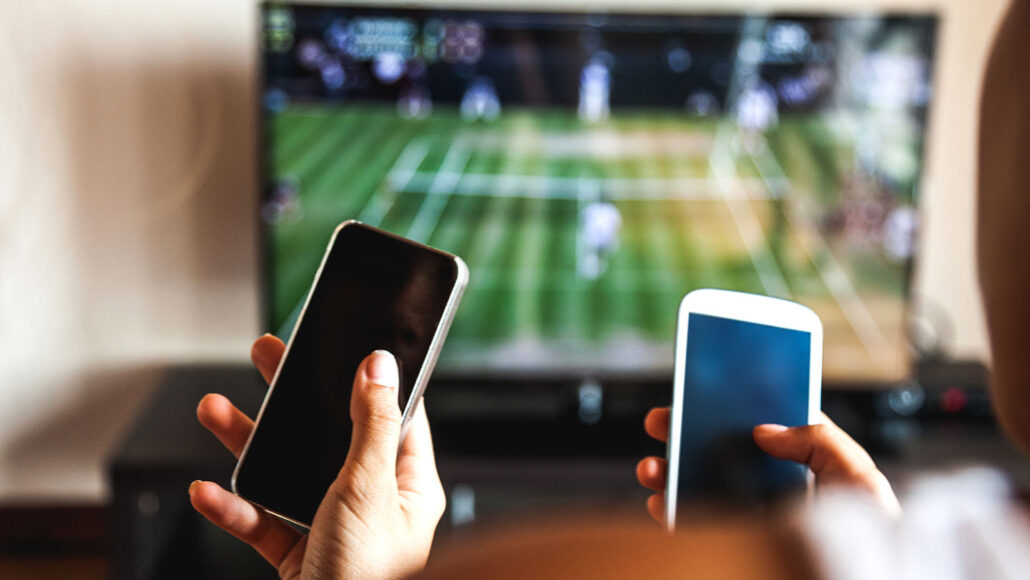Can’t remember? Maybe you multitask too much between screens
And you don’t have to be multitasking when you’re making those faulty memories

Many people check their phones while watching TV or videos or doing other screen-based activities.
LeoPatrizi/iStock/Getty Images Plus
Ever played a game on your phone while watching TV or YouTube? Checked social media during an online class? Perhaps you’ve texted a friend while gaming on a console? If so, you’re not alone. Screens are a major part of our lives. Today, many people use multiple screens at once. But such multitasking of screentime can impair our attention and memory — even when we’re no longer multitasking. That’s the finding of a new study. Although conducted in adults, its findings likely hold for teens as well.
Kids use technology more than ever. One report found that the average adolescent (8- to 18-year old) spends seven hours and 38 minutes on screens each day. But that’s only part of the picture. Many of these kids use two devices at once for more than three of those hours. That brings their total screen time to a whopping 10 hours and 45 minutes a day!
Psychologists had suspected that using multiple forms of media at once could lead to problems with attention and memory. But they weren’t sure the two were related. Kevin Madore and Anthony Wagner decided to put this idea to a test. Both are psychologists at Stanford University in California.
They and their team recruited 80 young adults, 18- to 26-years old. All came into the lab where they answered questions about their everyday attention, mind-wandering experiences and media multitasking. They also performed a memory task.
The first step of that task required them to classify images. They were asked to rate some as pleasant or unpleasant. Others as big or small. After a 10-minute break, they viewed another set of images. Some of these had been in the first group. Participants had to recall whether each image had been in the first set. For some, they also had to remember whether they had rated it as pleasant or unpleasant the first time (or bigger versus smaller).
The researchers also recorded brain activity in the recruits as they paid attention to what each was shown. For this, the researchers used an EEG. That’s short for electroencephalogram (Ee-LEK-troh-en-SEFF-uh-loh-gram). It collects data through a net of sensors placed on the scalp.
The researchers were especially interested in activity in the frontal and parietal (Puh-RYE-uh-tuhl) lobes. These brain areas are involved with attention and memory. The team was looking for specific brainwaves in these areas. Some, called alpha waves, decrease when we pay close attention to something. Then they’ll increase as our mind wanders. The researchers also used an eye tracker. It recorded changes in pupil dilation. With close attention, our pupils dilate and contract over and over. But as we zone out, our pupils shrink.
People who reported more media multitasking in their lives were more likely to forget images from the first set of pictures they’d seen. The EEG and pupil-dilation recordings showed that these people also had a harder time paying attention during the task.
The researchers then examined these data during the single second before someone categorized an image in the second part of the testing. That’s when the brain should be paying attention as we try to remember something. Pupils shrank and alpha-brain-waves increased right before someone incorrectly categorized images. People who multitasked less, however, showed no such brain and eye changes. They also performed better on the memory task.
It’s important to note, the researchers say, that media multitasking and gaps in attention or memory were correlated here. That means they appeared related. It does not, however, mean one caused the other. We shouldn’t confuse the two, they point out.
The team reported its findings in the November 5 Nature.
What to make of this
“We know that multitasking in general has switch costs,” Madore says. That means “we typically take longer to do a task.” And, he adds, “We typically make more errors when we do so.”
Those switch costs don’t only happen while multitasking. We can exhibit poorer attention and memory even when we’re supposedly focusing on only one task, the new study shows. “Our attention has limits and the power of distraction can be big,” Madore adds. That’s why, he cautions, “We should be mindful of how we engage with media” — and how it might affect attention and memory elsewhere in our lives.
Ashleigh Maxcey agrees. This psychologist works at Vanderbilt University in Nashville, Tenn. “Will catching yourself in the moment when you are media multitasking help reduce attention lapses and memory? It’s not clear yet,” she notes. “But if you want to improve your memory,” she says, “it is worth a shot to not media multitask.”
The new study focused on young adults. But younger teens should take note. Switching tasks requires the frontal lobe. That area of the brain is still developing in teens and young adults, Maxcey points out. “When some kind of [less than ideal] functioning is found in a healthy adult brain,” she says, “then the problem is probably heightened in a [teen’s] still-developing brain.”







